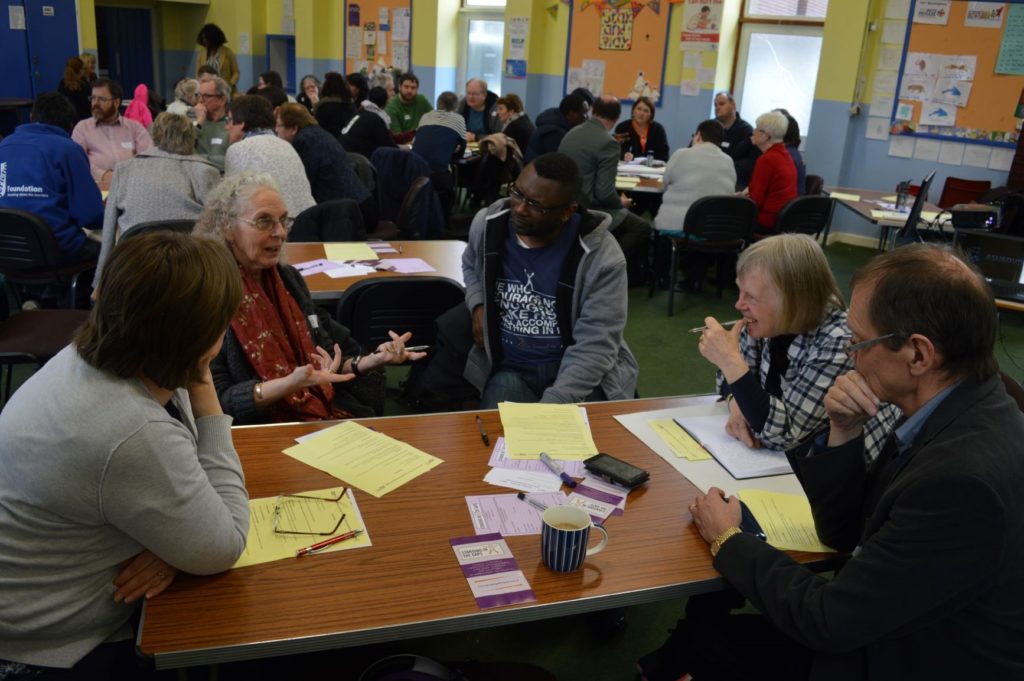Colin Marsh has been the Ecumenical Development Officer at Birmingham Churches Together (BCT) for the past 14 years. As he retired at the end of March 2020, he spoke to CTE’s Sarah Ball about how ecumenical work has changed and the new challenges…
Colin: When I started the role, ecumenism was more about moving towards structural and doctrinal unity. Over recent years, with us in the West Midlands, it has clearly been more activist, about becoming connecting God’s mission into communities. The focus is now on helping churches think about how they can link into community activities, work with local charities and generally be more outward-looking.
I think the key for ecumenical officers is to build bridges between networks. That’s clearly been the most satisfying part of the role for me.
Sarah: And bridges between the churches?
Colin: Oh yes. A great example of this in Birmingham is The Sanctuary, a project supporting refugees and asylum seekers. It was set up by two traditions, the Catholic Church and the Salvation Army, who a generation ago would have struggled to even speak with each other. It shows what can be achieved when we begin working together and respond to the call of God.
“Unity is a gift from God to be valued, cherished and nurtured, and is unearthed when we begin sharing together in God’s mission, especially with partners from ethnic, cultural and Christian backgrounds that are different from our own.”
Sarah: Does your region have particular challenges for Christian unity?
Colin: We work across the West Midlands; Birmingham is a city of over a million, and Solihull has its own separate identity. According to a recent report from Birmingham City Council on social cohesion, people from over 200 countries have made Birmingham their home. Many of our churches represent Christian communities from across the globe who have set up fellowships reflecting the language, culture and tradition of their countries of origin. Many of these are gathered congregations who travel to their place of worship without necessarily having direct connections or investment in the locality or neighbourhood where they meet. This is one of the main reasons why I think it’s very different to having a Churches Together group in a rural county town.
The city as a whole now reflects the full diversity of World Christianity, with Pentecostal, Apostolic, Evangelical, Charismatic and Orthodox expressions of worship. At times it’s felt fragmented, with almost a sense of competition emerging between the churches. However, it is heartening when leaders reach out to build relationships with others as happened frequently. I found they always appreciated any support I offered to help navigate the city’s complex Christian networks…and that’s why it was so key to build those relationships, those bridges.

Sarah: BCT has recently revamped its website. How important are digital communications for you?
Colin: They are vital. When I started, one of my main tasks was putting together a magazine for BCT. It was a useful conduit of who was doing what and who needed help; now those connections are often made on social media or via the website.
Sarah: What was your proudest moment at BCT?
Colin: Well, it’s hard to single one out. I think as I’m retiring, I’m pleased to see that churches in our area see the need for unity and the value in ecumenism. That’s largely no longer up for debate.
However I was especially pleased when I brought together people who would not normally meet, for example introducing a group of Orthodox leaders to the BCT Presidents or organising an event to bring people together around a theme, such as supporting people facing unemployment
Sarah: I can’t imagine you slipping into sedentary retirement, Colin. What’s next for you?
Colin: I am going to take a little time out, catch up on reading I’ve wanted to do. Then I’m going to do more research into the disconnect between people and the countryside, which happened in the 18th century with the Enclosure Acts. I also plan to use my skills as a strategic thinker and planner to help small charities build their resilience and the longevity of their projects. It seems to me there’s often a gap here in grass-roots organisations.
Sarah: After 14 years as a county ecumenical officer, what advice would you give to others in the same role?
Colin: You can’t always know what will work. Try new things. If they fail, don’t retreat, explore. You always learn something from the experience.